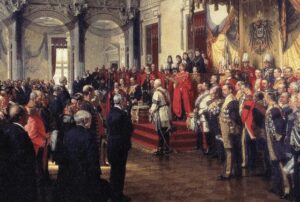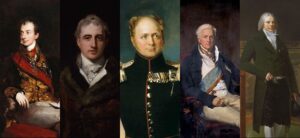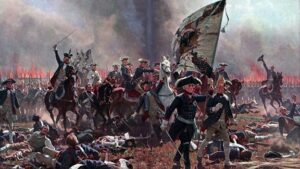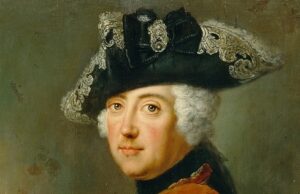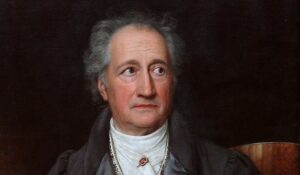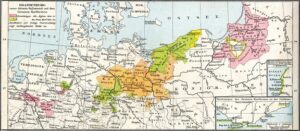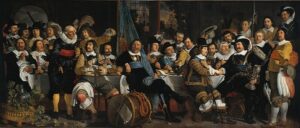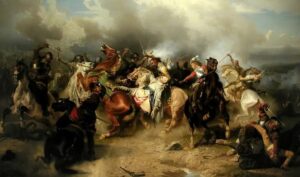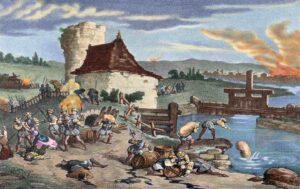In 1800, there was no Germany - at least not in the form we know today. Instead, the region was a patchwork of over 300 kingdoms, duchies, and free cities, all loosely connected by language but divided by law, custom, and ruler. Yet by 1871, these pieces had fused into one of the most powerful empires in Europe. The story of 19th Century and … [Read more...]
The Congress of Vienna and the German Confederation
In the aftermath of the Napoleonic Wars, Europe was in disarray. Borders had been redrawn, monarchies had toppled, and centuries-old empires were in ruins. The French Revolution and Napoleon’s campaigns had not only devastated Europe physically but also shaken its political foundations. In response, the major powers of Europe convened in 1815 at … [Read more...]
The Napoleonic Wars and the Confederation of the Rhine
In the early 19th century, Europe was upended by the ambitions of one man: Napoleon Bonaparte. While his empire rose and fell in just over a decade, his influence reverberated for generations. No region was more profoundly affected than the German-speaking lands, which experienced the violent collapse of the Holy Roman Empire, sweeping legal and … [Read more...]
Frederick the Great of Prussia
Few figures in German history cast as long a shadow as Frederick II of Prussia, better known as Frederick the Great. Ruling from 1740 to 1786, he took a modest, militarized kingdom and elevated it to the ranks of Europe’s great powers. Yet Frederick wasn’t just a warrior-king - he was also a musician, philosopher, and patron of the … [Read more...]
German Science and Culture in 18th Century
The 18th century was a golden era of intellectual and cultural blossoming across Europe - and Germany was at its heart. From natural science to literature, philosophy to music, the German states produced a wave of thinkers, artists, and innovators who left a profound mark on human knowledge and creativity. This wasn’t just a time of abstract … [Read more...]
The Enlightenment in the German States
In the 18th century, a new intellectual force swept across Europe: the Enlightenment. Germany, long seen as fragmented and provincial, became one of its most vibrant arenas. From royal courts to tiny universities, from Lutheran parishes to coffee houses, thinkers across the German lands began to question old authorities and champion new ideals - … [Read more...]
Rise of Brandenburg-Prussia
In the aftermath of the Thirty Years’ War, most of Germany lay in ruins - disunited, depopulated, and politically fragmented. Yet out of this chaos rose a seemingly unlikely power: Brandenburg-Prussia. Small, scattered, and lacking natural resources, the state would transform over the next century into a disciplined, centralized, and respected … [Read more...]
The Peace of Westphalia (1648)
On October 24, 1648, after thirty years of bloodshed, destruction, and famine, the signing of the Peace of Westphalia in the cities of Münster and Osnabrück marked the end of the Thirty Years’ War - a conflict that had devastated much of Europe, especially the German lands. But these treaties didn’t just silence cannons - they reshaped Germany’s … [Read more...]
The Thirty Years’ War and Its Impact on Germany
Germany in the early 1600s was a mosaic of duchies, bishoprics, and free cities - all held loosely together within the Holy Roman Empire. But underneath that fragile peace simmered deep divisions: Catholic vs. Protestant, emperor vs. princes, and local power vs. foreign ambition. When these tensions erupted in 1618, they unleashed one of the … [Read more...]
The German Peasants’ War (1524–1525)
In 1524, the rural towns and countryside of the Holy Roman Empire exploded in revolt. Fueled by spiritual awakening, rising expectations, and long-simmering grievances, tens of thousands of peasants, laborers, and lower-class townsfolk took up arms. Their goal? To end centuries of feudal oppression - and to claim the spiritual and social freedom … [Read more...]
- « Previous Page
- 1
- 2
- 3
- 4
- …
- 6
- Next Page »
